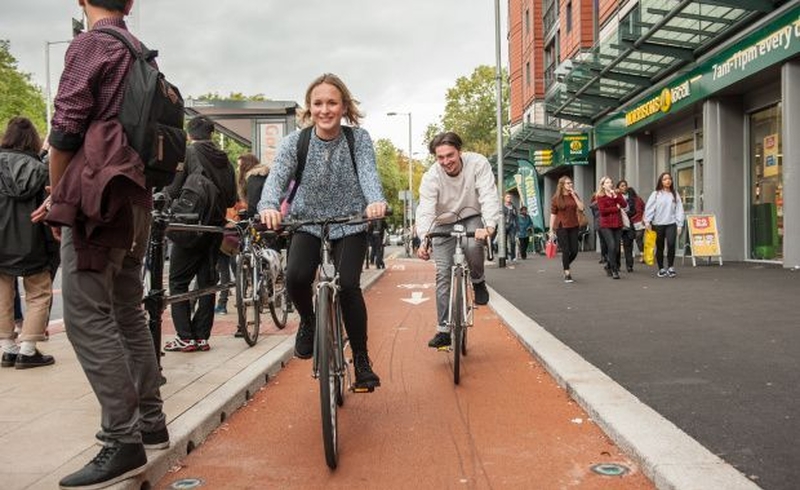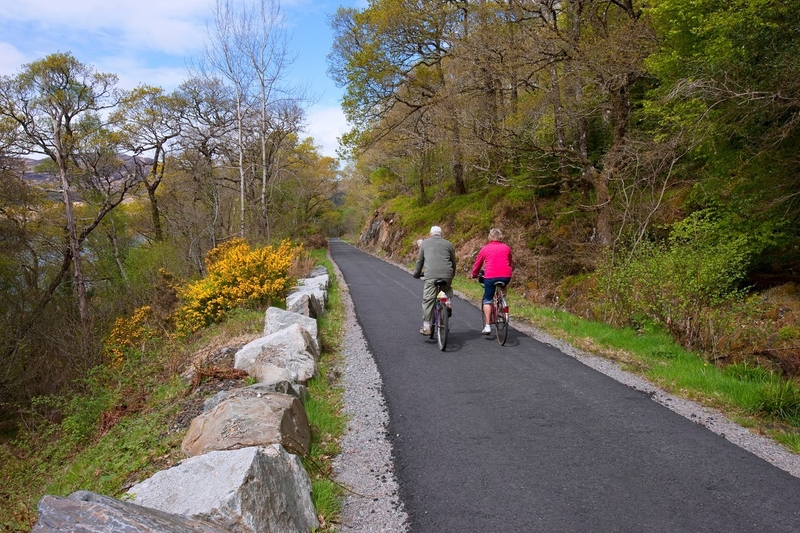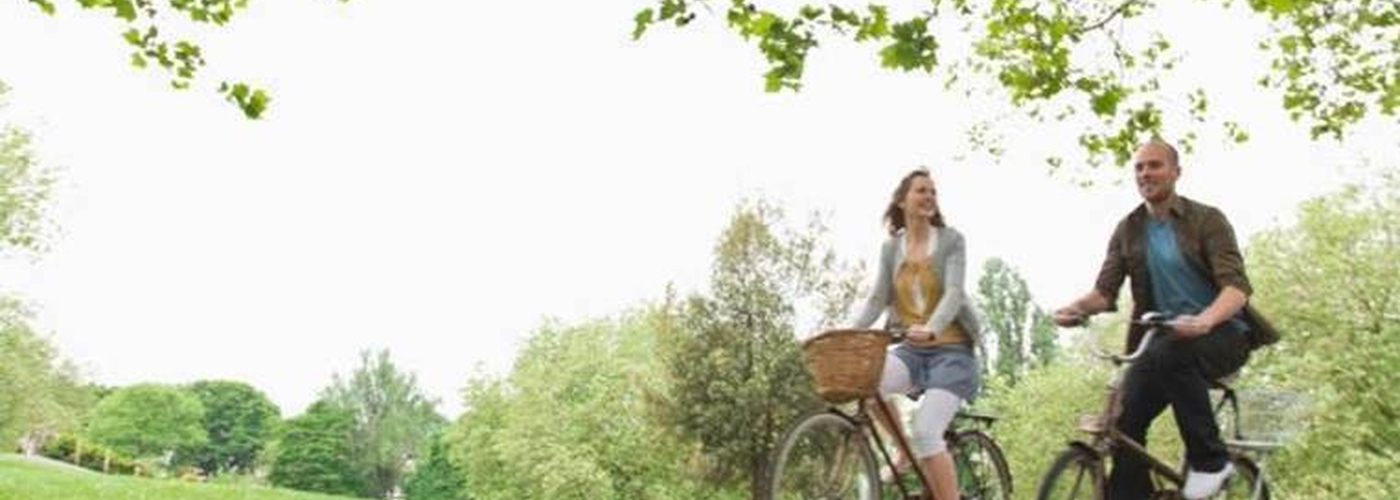A special fund is to be established to pay for a vast network of temporary cycle lanes
IN the coming months we could see our transport network bolstered with protected ‘pop-up’ cycle lanes on major roads to help people get to work safely and restart our economy. The proposed bike lanes come as public transport capacity is reduced by 90% due to social distancing measures, amid fears of an explosion of car use that will overwhelm our road network. With a significant number of people not owning a car, there’s urgent need for an alternative option to help people get around.
Let’s banish the worst of this terrible pandemic and hold on to the surprising pleasures of lockdown
A report to Liverpool City Council’s Cabinet on Friday (5 June) is recommending that a fund be created to help the city introduce potentially up to 65 miles of pop-up cycle lanes along seven key routes across the city.
The first branch covering two miles has now been established on West Derby Road - along the eastern corridor into the city centre - and the council’s highways team have now identified the remaining routes.
Liverpool’s segregated pop-up cycle lanes will be introduced over the coming weeks and months as a response to the Covid-19 impact on people’s travel plans, with the aim of connecting cyclists to the city’s permanent cycle network
The seven pop-up routes will be:
Route 1 - West Derby Road – Kensington - City South
Route 2 - Sefton Park to City Centre –Sefton Park perimeter - Sefton Park Road - Kingsley Road - Crown Street – Hall Lane - University hospital
Route 3 - Liverpool Loop North: Bootle New Strand - Bank Hall - Vauxhall – City Centre
Route 4 - LCWIP North: East Lancs - Townsend - Breck Road – City Centre
Route 5 – LCWIP East: East Prescot Road - University Hospital - London Road – City Centre
Route 6 - LCWIP South (University Route): Gateacre - Woolton Road - Wavertree - Lawrence Road - Crown Street - Myrtle Street – City Centre
Route 7 - Liverpool Loop South: Hale - Speke Boulevard - Garston Village - Aigburth Road – City Centre
Funding for the pop up cycle lanes is to be sourced from the council’s highways investment programme and via the Active Travel Grant established by the Department of Transport. A further £100,000 has been identified to invest in upgrading infrastructure for Liverpool’s existing CityBike hire scheme.
The proposed £4m pop-up cycling fund is part of a wider £15.5m investment in a new phase of Liverpool’s £500m Better Roads programme.
The outstanding £11.4m is to be spent across three phases of highways maintenance and footway repairs along major roads such as Edge Lane and Walton Lane, as well as upgrading nine traffic signal schemes.
These programmes of works are to be awarded to companies already on the council’s procurement framework system, most of whom are local companies who have signed up to support the council’s local supply chain charter.
In addition to this new £15.5m investment, the council is currently overseeing a £45m upgrade to city centre connectivity and is introducing 11km of new permanent cycle lanes. It is also about to look at expanding its 20mph zones to further improve safety and air pollution.
To promote cycling in the city the Mayor of Liverpool is inviting councillors, businesses and the public to come forward with ideas on how to improve access for cyclists and pedestrians.
People are encouraged to post their views online here
They can also ask questions via email atcyclingwalking@liverpool.gov.uk
Where should there be pop-up cycle lanes in Liverpool? Have your say, mark it on the map.https://t.co/8h9gTRpznR pic.twitter.com/pS5YIsWoVr
— MerseyCycleCampaign (@merseycyclists) May 21, 2020
Investing in the network could be a smart move: walking and cycling is estimated to return £5.50 in indirect economic benefits for every £1 invested. Cycling has boomed during lockdown - up 42% in the region - and bike shops have never been busier.
Mayor of Liverpool, Joe Anderson, said: “Covid-19 has forced everyone to look at how cities can adapt to make it easier and safer for people to cycle.
“In a very short time we’ve started to deliver this new network of pop-up cycle lanes and this level of investment underlines our commitment to ensure this is implemented right across the city.
“I’ve been greatly encouraged by the feedback to date from cyclists - old and new - and I know there are ways we can improve further. Upgrading the CityBike scheme is another step in the right direction and we will continue to listen to see what other opportunities there are to make improvements.”
Evidently, quieter roads have led to more people pedalling. It chimes with years of research that has consistently shown safety concerns to be the biggest barrier to cycling in the UK and that protected bike lanes separated from traffic is the number one thing that would turn this around. It’s no coincidence that protected cycle lanes are the hallmark of cycling infrastructure in places like Denmark where cycling is so commonplace and ubiquitous that there are more bikes than people.

Councillor Sharon Connor, Liverpool City Council’s Cabinet Member for Highways, said: “I’m delighted that the council is putting so much effort and money into these pop-up cycle lanes. They will greatly enhance the existing network and the new permanent lanes we have been creating. I cycled the West Derby route the other day and found it very safe and easy to use.
“As well as cycling this is a hugely welcome report as we continue to seek to improve our roads to the benefit of our communities and economy. These works will be mainly delivered by local businesses and it’s important we can use our highways investment programme to support local jobs and apprenticeships, especially at such a fragile time for many businesses.”
Simon O’Brien, Liverpool’s Cycling Commissioner, added: “This terrible disease has meant we had to change how we live our lives overnight. Now it’s time to change the way we live in our city for the future. These pop-up cycle lanes will allow everyone to have a real choice of how to get around Liverpool. It’s also an amazing opportunity to test out the permanent network of cycle lanes that the Mayor has asked me to help create in the next few years.
“This is the moment for every community to rethink, not just the city centre, but our local high streets and our own neighbourhoods. Let’s banish the worst of this terrible pandemic and hold on to the surprising pleasures of lockdown. Safe, quiet streets, clean air and a rediscovered love of the world on our doorsteps. These bike lanes will be a vital part of a new even better Liverpool where people come first.”

This proposed cycle network is all about making cycling an ordinary mode of transport accessible to many more people. The idea isn’t to eliminate cars or public transport, but rather to supplement the transport network with another mode. Doing so will also build greater equity into transport.
Statistics tell us what is self-evident: the poorest are least likely to own a car and most dependent on public transport, meaning a cycle network will be particularly beneficial for ensuring access to jobs across all income levels.
Safe space for cycling is also an equality issue with women, older people, and people from ethnic minorities amongst the groups least likely to cycle in Britain. Instead, it remains predominantly the domain of the so-called ‘MAMIL’ (middle-aged-men-in-lycra) who, it seems, are happy to ride at speed alongside traffic. In contrast, in places like the Netherlands, more women cycle than men. They don’t wear lycra or helmets because the infrastructure is so safe cycling is an easy way to travel for ‘normal’ people.
There are also the obvious health benefits. The UK is the most obese country in Europe, costing the local NHS more than £500,000 a week. In this regard e-bikes are brilliant, enabling people to get moderate exercise while having that additional boost to get up those hills.
With lockdown easing and public transport capacity severely compromised for the foreseeable future, we need to do everything we can to help people move around the region, to jobs, shops, and bars and restaurants. With funds earmarked specifically for cycling corridors to supplement public transport, it would seem daft not to build the cycle network proposed that will support a truly robust transport network in the region. We could be on the brink of a cycling revolution - we’ll soon find out whether our politicians pull it off.















